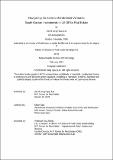Navigating the Storms of Distressed Ventures: South Korean Investments in US Office Real Estate
Author(s)
Lee, David Sang Hyup
DownloadThesis PDF (1.372Mb)
Advisor
Saiz, Albert
Terms of use
Metadata
Show full item recordAbstract
During the early to mid-2010s, Korean investors flooded into the US office real estate market, enticed by the promise of higher returns in an era of low interest rates. At this time, the Korean base interest rate exceeded the Fed funds rate, minimizing losses from currency hedging. The allure of investment was further magnified by the "herding effect" – a phenomenon driven by headlines of Korean institutions achieving success in the US office market. Fear of missing out (FOMO) and pressure from executives propelled a wave of Korean investments into the same sector. Today, Korean investors face distress in this market. The aftermath of COVID-19 has led to a significant decline in demand for office space, with employees reluctant to return to physical offices. Furthermore, the distress extends beyond demand dynamics; it encompasses financial turmoil caused by the Federal Reserve's rapid interest rate hikes. These hikes have created a double-edged sword, adversely impacting both equity investors struggling to meet loan obligations and lenders unable to recoup their loans. This thesis explores potential solutions through real-life case studies, drawing from the author's experience working at a number of real estate private equity firms. The path to resolution, though, is fraught with challenges, including but not limited to: information asymmetry, moral hazards, a lack of experience in US office market distress, complex investment committee approval procedures, and the entanglement of numerous investors in single deals. This thesis sheds light on these complexities while offering insights into navigating the distressed landscape of US office real estate investments for Korean investors.
Date issued
2024-02Department
Massachusetts Institute of Technology. Center for Real Estate. Program in Real Estate Development.Publisher
Massachusetts Institute of Technology